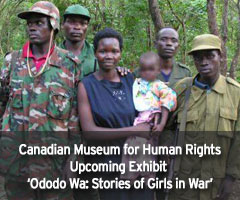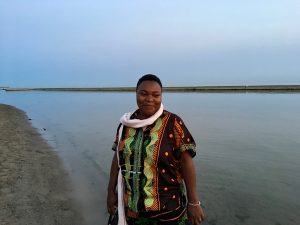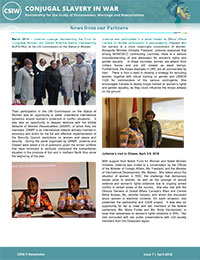A lawyer by training, Ms. Mambo is passionate about women’s and children’s rights promotion and defense, one of the missions of Solidarité feminine pour la paix et le développement intégral (SOFEPADI) in the Democratic Republic of Congo. As the coordinator, she coordinates all activities in SOFEPADI to materialize the noble vision of living in a DRC where women and girl have equal access to rights as men. To achieve this, SOFEPADI is engaged in combating impunity of violence against women through direct support to survivors and advocacy for reparations. In addition to promoting community engagement and raising awareness of violence against women, SOFEPADI works with community leaders, customary leaders and youth for their effective involvement in combating gender-based violence. For women and youth who break silence, SOFEPADI provides legal support through legal clinics available in Beni, Bunia, Oicha and Mahagi. Thanks to the Working Group Against Impunity led by SOFEPADI in Beni, support for the holding of mobile court hearings helps facilitate access to justice for victims and rebuild the image of justice in the community.
Ms. Cooper is the Executive Director of Aiding Abused Women and Girls Association (ADWANGA). Amelia holds a BA Degree in Management from the University of Liberia and a diploma in counseling and social work from Community Empowerment and Sustainable Program (CESP). She worked for several Entities as Executive Secretary and Administrator strengthening her to join a group of women to establish ADWANGA.
Anna M. Agathangelou is an Associate Professor in Political Science with a focus on Postcolonial theory, International Political Economy, Transnational Feminisms, and Racialization and Bodies in world politics. Her current research focuses on corporeality and the use of science, technology, and law knowledge in global power shifts and social order. She is also currently engaged in a study of the global and political dimensions of post-conflict DNA identification of the missing and disappeared in a variety of contexts.
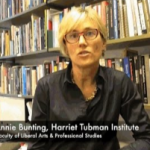 Annie Bunting
Annie Bunting is the principal investigator of the Social Sciences and Humanities Research Council (SSHRC) funded project on Conjugal Slavery in War (CSiW, 2015-2020). She is an Associate Professor in the Law and Society Program at York University, teaching in the areas of social justice and human rights. Her research interests are international human rights; culture and legal anthropology; critical contemporary slavery; and early, forced and child marriage with a focus on West Africa. She has co-edited collections titled
Marriage by Force? Contestations over Coercion and Consent in Africa (Ohio Univ. Press, 2016) and
Contemporary Slavery: Popular Rhetoric and Political Practice (Univ. of British Columbia Press, 2017)
.Benedetta Rossi is Reader in African History and Anthropology at the School of History and Cultures of the University of Birmingham. She is the author of ‘From Slavery to Aid: Politics, Labour and Ecology in the Nigerien Sahel, 1800-2000’ (Cambridge University Press, 2015) and editor of ‘Reconfiguring Slavery: West African Trajectories’ (Liverpool University Press, 2009). She is currently working on a book on the history of emancipation in twentieth-century Africa contracted to Cambridge University Press (New Approaches to African History Series).
Bruno Véras is a doctoral student in History, working with Professor Paul Lovejoy on the history of slavery in Brazil. Bruno is a filmmaker and teacher who brings histories of slavery to a broad audience. He is the lead creator of the website
Baquaqua which includes material for school aged children. Bruno is creating a catalogue of Professor Paul Lovejoy’s primary and secondary material on concubinage and marriage in northern Nigeria. He is also updating the bibliography of historical literature on marriage and slavery for the project’s sub-theme on histories of gender norms and forced marriage in Nigeria. He is part of a team of three graduate students and one postdoctoral fellow at York supporting the work of the Partnership. His doctoral project is entitled “Enslaved Muslims in the Nineteenth Century Trans-Atlantic Slave Trade”. It builds on well established literature on slave biographies and the slave trade and deepens our understanding of religious negotiation and identity of enslaved Muslim Africans.
Christopher Dolan is the director of the Refugee Law Project (RLP) project. With a background in issues of forced migration and conflict, he now has the ambitious task of transforming the RLP from a project into a fully-fledged institute and leader on justice and forced migration issues in East Africa and beyond.
Erin Baines is an Associate Professor at the Liu Institute for Global Issues at the University of British Columbia. Her research interests include transitional justice; the politics of humanitarianism and forced displacement; and, the study of gender and armed conflict, with a regional focus on northern Uganda. She has published articles on gender, responsibility and transitional justice, DDR, social repair, symbolic violence and forced marriage. In 2015, she edited the memoire of Evelyn Amony, a human rights activist for women forced into marriage in the Lord’s Resistance Army, titled I am Evelyn Amony: Reclaiming my life from the LRA (Wisconsin Press). Erin is author of Vulnerable Bodies: Gender, the UN and the Global Refugee Crisis (Ashgate, 2014).
Erin’ recent book, Buried in the Heart: Women, Complex Victimhood and the war in northern Uganda, explores the political agency of women abducted as children by the Lord’s Resistance Army in northern Uganda, forced to marry its commanders, and to bear their children. Introducing the concept of complex victimhood, she argues that abducted women were not passive victims, but navigated complex social and political worlds that were life inside the violent armed group. Exploring the life stories of thirty women, Baines considers the possibilities of storytelling to reclaim one’s sense of self and relations to others, and to generate political judgement after mass violence. Buried in the Heart moves beyond victim and perpetrator frameworks prevalent in the field of transitional justice, shifting the attention to stories of living through mass violence and the possibilities of remaking communities after it. The book contributes to an overlooked aspect of international justice: women’s political agency during wartime.
Professor
Breton-LeGoff is a lecturer at the Université du Québec à Montréal, where she teaches international human rights law and public international law. She researches and has written numerous articles and books on the role of NGOs in international standards development and their contribution to international justice. She is a member of the Coalition pour les droits des femmes en situation de conflit (Coalition for Women’s Rights in Conflict Situations) and has worked for the Office of the United Nations High Commissioner for Human Rights, and the Ministry of Foreign Affairs and International Trade Canada. She has published several articles and presented numerous conference papers on rape and gender violence in the DRC.
Gertrude Mianda is an associate professor in the Gender and Women’s Studies program at York University’s Glendon campus. She is a former Chair of York University’s School of Gender, Sexuality and Women’s Studies. Her research interests include: Gender and Development and Globalization, focusing on Congolese women; Gender and Post-colonialism, focusing on the Congolese; Globalization and Immigration, focusing primarily on francophone African women in the minority francophone community in Canada. Currently she is working on the Informal Sector and Women in Kinshasa, Children Born of War in DRC, and the Rape of Women and Girls in Kinshasa. In addition to
Femmes africaines et pouvoir: Les maraichères de Kinshasa (1996), Professor Mianda has published a number of book chapters and articles in edited collections and journals.
Gisèle Eva Côté brings over 25 years of international experience to Partnership Africa Canada (PAC), including in the design and management of projects that address human rights, women’s rights, indigenous rights, as well as land and natural resources. She has extensive field experience, supporting grassroots organizations and non-profits in Latin America and Africa, and in particular in the Democratic Republic of Congo. Her research has focused on crimes of sexual violence in conflict and post-conflict context, and examining mining issues with a gender lens.
Godeliève Mukasarasi is the founder of Solidarity for the Development of Widows and Orphans to Promote Self-Sufficiency and Livelihoods (SEVOTA), an organization that promotes the socio-economic rights of Rwandans widowed and orphaned by the 1994 Rwandan genocide. Immediately following the genocide Godeliève used her background in social work to establish an organization that addresses the needs of women and children left vulnerable in the aftermath of the genocide – SEVOTA. Together with a dedicated staff, Godeliève delivers peace and reconciliation programming to mobilize widows and orphans towards a culture of peace and non-violence. SEVOTA brings together 80 associations with over 2 000 members to support genocide survivors. Godeliève also works through SEVOTA to ensure genocide sexual violence survivors receive necessary psychological and health services and is an advocate for the support of children born of rape and forced marriages.
Ms. Grace Ogwal Acan works with the Justice and Reconciliation Project with Ms Erin Baines of the Lui Institue in Gulu Uganda. She is currently pursuing a Bachelor’s Degree at Guly University in Northern Uganda and Volunteering with Ododo War, a project through the Justice and Reconciliation Project, which works with women formerly abducted by the Lord’s Resistance Army in Northern Uganda.
Heather Tasker is a PhD student in Socio-Legal Studies at York University. She has worked as a Research Assistant with CSiW/ECtG since 2016, primarily in the Justice thematic group. Heather’s research interests are in critical humanitarian and security studies, feminist approaches to international law, and transitional justice. Her dissertation analyzes intersections of UN peacekeeping and sexual violence in the Democratic Republic of Congo through lenses of international law, community perceptions, and means of achieving accountability and justice. She currently holds a Joseph-Armand Bombardier Canada Graduate Scholarship (2018-2021). Heather can be reached at
hctasker@yorku.ca.
Dr. Izevbuwa Kehinde Ikhimiukor is currently a Postdoctoral Fellow at the Tubman Institute, York University. She has an LL.M from the University of Sheffield and a PhD in international criminal law from Middlesex University. Her research interests include: international law, international criminal law, international human rights and international humanitarian law. She has served as a Research Associate at the School of Oriental and African Studies (SOAS), University of London. She was also a participant at the 44th Session of the International Law Seminar at the United Nations Office in Geneva.
Jen completed her undergraduate honours bachelors’ degree in History and Contemporary Studies at Wilfrid Laurier University, and earned a post-graduate certificate from Humber College in Global Business Management. She is currently a Master’s candidate in the Development Studies program at York University. Her research interests focus on child marriage in Francophone Africa, and she is very interested in the intersections between culture, religion, gender and law. She is also working as a research assistant in the Children Born of War thematic group. Jen believes that the work achieved on the CSiW project will be significant to numerous communities and to the field of research. Ultimately, she intends to complete her doctorate or work as a public interest lawyer, and is certain that the skills and knowledge gained on this project will be helpful to her future endeavours.
Joel Quirk is an Associate Professor and the Head of the Department of Political Studies, University of the Witwatersrand, Johannesburg. His research focuses on slavery and abolition, human mobility and human rights, social movements and political arguments, global governance and the politics of numbers, and the history and politics of sub-Saharan Africa. Joel is the author or editor of seven books, including The Anti-Slavery Project (2011), Mobility Makes States (2015), and
Contemporary Slavery: Popular Rhetoric and Political Practice (in press). He is a member of the International Scientific Committee of the UNESCO Slave Route Project, where he serves as Rapporteur, and is also an editor for open Democracy’s ‘Beyond Trafficking and Slavery.’
Joshua Walker received his PhD in sociocultural anthropology from the University of Chicago in 2014. Since June 2014, he has been a Postdoctoral Fellow at the University of the Witwatersrand: first, at the Wits Institute for Social and Economic Research (WiSER), and, since June 2016, in the Department of Political Studies. His doctoral dissertation, which he is preparing for publication as a book, examines the social effects of economic decline on Mbujimayi, a longstanding Congolese diamond mining town. He has also begun work on a new research project as part of the Conjugal Slavery in War research network, entitled “‘I Will Never Marry a Luba Man’: Gender, Marriage, and Ethnicity in Central Democratic Republic of Congo (DRC).” In addition to his own research, Walker has co-authored papers with the Centre for Sustainability in Mining and Industry (CSMI) at the University of the Witwatersrand on the social and environmental impacts of the new South African legislation on mining and artisanal and small-scale mining policy reform in Africa. He is fluent in French and Cilubà, and speaks proficient Lingala and Spanish.
Judit
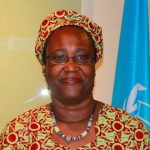
h-Ann Walker is a development practitioner with 23 years of experience designing, implementing and evaluating social sector development interventions targeting women and girls in Nigeria. She is a former Lecturer at Bayero University Kano where she pioneered the Masters in Development Studies. She is also a founding member and current Coordinator of the indigenous non-profit, the development Research and Projects Centre (dRPC) where she leads on the Gates foundation funded Partnership for Advocacy in Child and Family Health (PACFaH) project. Judith-Ann holds PhD and Masters Degrees in Development Studies from the International Institute of Social Studies of the University of Erasmus, Rotterdam, the Netherlands, majoring in gender and development. She also holds BSc Honors Degree in Government from the University of the West Indies, St. Augustine, Trinidad and Tobago. In addition, she also holds a post-graduate diploma in Decentralization, Rural Planning and Administration, 1988, from the DSE, Department of Development Co-operation, German Ministry of Foreign Affairs, Berlin. Judith-Ann was born in Trinidad and Tobago, where she was a Lecturer at the University of the West Indies and Senior Research Officer, Parliament, Government of Trinidad and Tobago. She is an Ashoka fellow; an Echidna Global Scholar; and a non-resident Fellow, Brookings Institution. She has several peer reviewed publications on gender and development. She is married and is the mother of 4 daughters.
Originally from Eastern Congo, Ms. Julienne Lusenge is a committed advocate for justice, peace and human rights, particularly women’s rights. She currently serves as Chair of SOFEPADI’s Board of Directors. Created in 2000 SOFEPADI is an organization that promotes women’s and girls’ rights in Beni (in the province of Nord-Kivu) and Ituri (in the Oriental province). SOFEPADI is a member of the Congolese Coalition for Transitional Justice (CCJT). SOFEPADI is also the focal point in the DRC of the Coalition for women’s human rights in conflict situations. Since 2003, SOFEPADI has been focusing on addressing women’s rights violations, more specifically crimes of sexual and socio-cultural violence. As part of its programme for combating impunity for sexual offenders in Beni, Bunia and across Eastern Congo, SOFEPADI is committed to provide legal assistance to women who are victims of sexual violence. A committed activist, she is the coordinator of the National Campaign of Congolese Women against Sexual Violence, launched in November 2007 in Montreal. This campaign led to the implementation of a Congolese Women’s Fund, which has been operational since July 2010.
I am currently pursuing a PhD in Interdisciplinary Studies Program and I work as a Researcher at the University of British Columbia’s Liu Institute for Global Issues, Canada. I hold a MA in international peace studies from the University of Notre Dame (United States) and a B.A. in community psychology from Makerere University (Uganda). As the Gender and Transitional Justice Expert with Uganda Fund, I coordinated and provided technical support to 12 non-profit organizations to implement conflict recovery and reintergration projects in Uganda. I have 12 years’ experience conducting peacebuilding, transitional justice, gender, relief and development programme planning and implementation at grassroots, national and international levels-specifically in Uganda, Colombia, Philippines, United States, and Cambodia. Further, I initiated and coordinated the gender justice program at the Justice and Reconciliation Project and led the creation of a grassroots women’s justice group, the Women’s Advocacy Network (WAN) in Uganda. I led several peace initiatives in Uganda and served as a transitional justice fellow with International Centre for Transitional Justice in South Africa. My PhD research is on sexual violence, social repair and transitional justice.
Nidhi Bansal is currently the Director of Gender Equality and Child Protection with Plan International Canada. In Ms. Bansal’s current role, her primary responsibility is to strengthen and support Plan International Canada’s capacity and expertise in the thematic areas of gender equality and child protection. This requires her to provide guidance, technical expertise and leadership to ensure gender transformative program design and implementation of current and future projects, as well as support policy and research development in the sector. Ms. Bansal has over 19 years of experience in International Development in several overseas project locations in Africa and Asia in advisory and management positions. In advisory roles, she has been providing technical support in mainstreaming gender in diverse sectorial programs focusing on sustainable livelihoods, education, governance and humanitarian response issues.
Her extensive professional experience and technical expertise lies in designing and managing projects on women and girls’ rights, addressing gender based violence, women’s economic empowerment and women’s political participation. Through her years of close engagement with projects and communities, Ms. Bansal has gained an in-depth understanding of gender equality issues in diverse socio-economic settings as well as skills to identify and implement successful program strategies to address those challenges.
Paul E. Lovejoy, Distinguishe

d Research Professor, Department of History, York University, and Fellow of the Royal Society of Canada. His publications include The Transatlantic Slave Trade and Slavery: New Directions in Teaching and Learning (2013), co-edited with Benjamin Bowser, and Jihad in West Africa during the Age of Revolutions (2016). Founding Director, Harriet Tubman Institute for Research on Africa and its Diasporas and Canada Research Chair in African Diaspora History (2000-15), he has received an Honorary Degree, University of Stirling (2007), the Distinguished Africanist Award, University of Texas – Austin (2010), Life Time Achievement Award, Canadian Association of African Studies (2011), and Graduate Studies Teaching Award, York University (2011). He is General Editor of the Harriet Tubman Series on the African Diaspora, Africa World Press.
Rahina Zarma is a Ph. D Candidate (ABD) at Osgoode Hall Law School, York University. She has an L.L.M. from the University of Saskatchewan and is licenced to practice law in Nigeria. Her research interests include access to justice, human rights, social movements, gender, and international law. She has consulted for the World Bank on global social inclusion issues, has served as a Refugee Officer (RSD) at the Nigerian Refugee Commission, and as a litigation lawyer handling human rights and constitutional cases in Nigeria. She has worked as a Research Assistant in the Justice thematic of the CSiW Project since May 2019, with her research focusing on the sufficiency of existing justice mechanisms for victims of gender-based violence in conflict situations in Africa.
Mrs. Mcarthy is the lead researcher for the Women’s Forum (Sierra Leone) and ongoing collaborator of the SSHRC project. She has been involved with the project since its inception as President of the Women’s Forum and continues to play a key role in implementing the project as a member of the executive. She brings invaluable experience contacts and knowledge of the conflict in Sierra Leone (1991-2002), the Truth and Reconciliation Commission(TRC), the Special Court of Sierra Leone(SCSL) the reparations and other post-conflict processes. She has years of experience in research, training and facilitating on gender equality, development and human rights issues with particular reference to women, peace and security, sexual and gender-based violence. She has participated in many meetings and conferences at home and abroad. She has also collaborated with the Coalition of Women’s Rights in Conflict Situations Rights and Democracy (Montreal, Canada) The Human Rights Commission of Sierra Leone(HRCSL), the Global Network of Women Peace Builders(GNWP), UN Women, the Reparations Directorate in Sierra Leone, and the Mano River Women Peace Network (MARWOPNET) and many other organizations.
Sarah Delius did her undergraduate and honours degree at the University of the Witwatersrand, specialising in history. This was followed by Master’s degree at the School of Oriental and African Studies from 2011 to 2012, where she majored in African military history, with a particular focus upon historical patterns of warfare in Mozambique. After being a freelance researcher for two years she has recently started her PhD in political studies at the University of the Witwatersrand. Her doctoral thesis focuses upon forced marriage in Sierra Leone, with her main line of inquiry being historical patterns associated with intersections between gender and warfare.
Teddy Atim has been working in northern Uganda since 2001. Her work focuses on the impact of serious crimes resulting from the conflict between the Government of Uganda and the Lord’s Resistance Army (LRA) rebels. Currently, she is a researcher at the Feinstein International Center at Tufts University where she leads research work on recovery, transitional justice, and reparations in northern Uganda. In the past, she worked as a practitioner with various national and international organizations in Uganda including the Concerned Parents Association, Save the Children, CARE International, American Jewish World Service, and the Democratic Governance Facility. With these organizations, she supported the rehabilitation, reintegration, and recovery of conflicted-affected people in northern Uganda with emphasis on gender, youth, and children. Teddy holds a B.A. in social sciences from Makerere University in Kampala, Uganda. She has an M.A. in humanitarian assistance from The Fletcher School of Law and Diplomacy and the Friedman School of Nutrition Science and Policy at Tufts University, where she was a Ford Foundation Fellow. Presently, she is in the final year of her Ph.D. at Wageningen University, the Netherlands.
Toni Smith is a PhD student at the University of Birmingham working on a project that focuses on masculinities in relation to sexual and gender- based violence in the Democratic Republic of Congo. She recently completed a Master’s degree in African Studies.
Véronique Bourget is the Project Coordinator for the Conjugal Slavery in War (CSiW) Project.
 Annie Bunting is the principal investigator of the Social Sciences and Humanities Research Council (SSHRC) funded project on Conjugal Slavery in War (CSiW, 2015-2020). She is an Associate Professor in the Law and Society Program at York University, teaching in the areas of social justice and human rights. Her research interests are international human rights; culture and legal anthropology; critical contemporary slavery; and early, forced and child marriage with a focus on West Africa. She has co-edited collections titled Marriage by Force? Contestations over Coercion and Consent in Africa (Ohio Univ. Press, 2016) and Contemporary Slavery: Popular Rhetoric and Political Practice (Univ. of British Columbia Press, 2017).
Annie Bunting is the principal investigator of the Social Sciences and Humanities Research Council (SSHRC) funded project on Conjugal Slavery in War (CSiW, 2015-2020). She is an Associate Professor in the Law and Society Program at York University, teaching in the areas of social justice and human rights. Her research interests are international human rights; culture and legal anthropology; critical contemporary slavery; and early, forced and child marriage with a focus on West Africa. She has co-edited collections titled Marriage by Force? Contestations over Coercion and Consent in Africa (Ohio Univ. Press, 2016) and Contemporary Slavery: Popular Rhetoric and Political Practice (Univ. of British Columbia Press, 2017). h-Ann Walker is a development practitioner with 23 years of experience designing, implementing and evaluating social sector development interventions targeting women and girls in Nigeria. She is a former Lecturer at Bayero University Kano where she pioneered the Masters in Development Studies. She is also a founding member and current Coordinator of the indigenous non-profit, the development Research and Projects Centre (dRPC) where she leads on the Gates foundation funded Partnership for Advocacy in Child and Family Health (PACFaH) project. Judith-Ann holds PhD and Masters Degrees in Development Studies from the International Institute of Social Studies of the University of Erasmus, Rotterdam, the Netherlands, majoring in gender and development. She also holds BSc Honors Degree in Government from the University of the West Indies, St. Augustine, Trinidad and Tobago. In addition, she also holds a post-graduate diploma in Decentralization, Rural Planning and Administration, 1988, from the DSE, Department of Development Co-operation, German Ministry of Foreign Affairs, Berlin. Judith-Ann was born in Trinidad and Tobago, where she was a Lecturer at the University of the West Indies and Senior Research Officer, Parliament, Government of Trinidad and Tobago. She is an Ashoka fellow; an Echidna Global Scholar; and a non-resident Fellow, Brookings Institution. She has several peer reviewed publications on gender and development. She is married and is the mother of 4 daughters.
h-Ann Walker is a development practitioner with 23 years of experience designing, implementing and evaluating social sector development interventions targeting women and girls in Nigeria. She is a former Lecturer at Bayero University Kano where she pioneered the Masters in Development Studies. She is also a founding member and current Coordinator of the indigenous non-profit, the development Research and Projects Centre (dRPC) where she leads on the Gates foundation funded Partnership for Advocacy in Child and Family Health (PACFaH) project. Judith-Ann holds PhD and Masters Degrees in Development Studies from the International Institute of Social Studies of the University of Erasmus, Rotterdam, the Netherlands, majoring in gender and development. She also holds BSc Honors Degree in Government from the University of the West Indies, St. Augustine, Trinidad and Tobago. In addition, she also holds a post-graduate diploma in Decentralization, Rural Planning and Administration, 1988, from the DSE, Department of Development Co-operation, German Ministry of Foreign Affairs, Berlin. Judith-Ann was born in Trinidad and Tobago, where she was a Lecturer at the University of the West Indies and Senior Research Officer, Parliament, Government of Trinidad and Tobago. She is an Ashoka fellow; an Echidna Global Scholar; and a non-resident Fellow, Brookings Institution. She has several peer reviewed publications on gender and development. She is married and is the mother of 4 daughters. d Research Professor, Department of History, York University, and Fellow of the Royal Society of Canada. His publications include The Transatlantic Slave Trade and Slavery: New Directions in Teaching and Learning (2013), co-edited with Benjamin Bowser, and Jihad in West Africa during the Age of Revolutions (2016). Founding Director, Harriet Tubman Institute for Research on Africa and its Diasporas and Canada Research Chair in African Diaspora History (2000-15), he has received an Honorary Degree, University of Stirling (2007), the Distinguished Africanist Award, University of Texas – Austin (2010), Life Time Achievement Award, Canadian Association of African Studies (2011), and Graduate Studies Teaching Award, York University (2011). He is General Editor of the Harriet Tubman Series on the African Diaspora, Africa World Press.
d Research Professor, Department of History, York University, and Fellow of the Royal Society of Canada. His publications include The Transatlantic Slave Trade and Slavery: New Directions in Teaching and Learning (2013), co-edited with Benjamin Bowser, and Jihad in West Africa during the Age of Revolutions (2016). Founding Director, Harriet Tubman Institute for Research on Africa and its Diasporas and Canada Research Chair in African Diaspora History (2000-15), he has received an Honorary Degree, University of Stirling (2007), the Distinguished Africanist Award, University of Texas – Austin (2010), Life Time Achievement Award, Canadian Association of African Studies (2011), and Graduate Studies Teaching Award, York University (2011). He is General Editor of the Harriet Tubman Series on the African Diaspora, Africa World Press.


